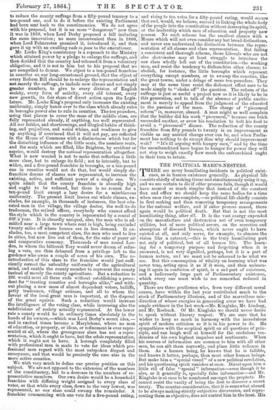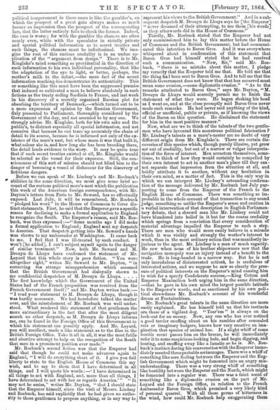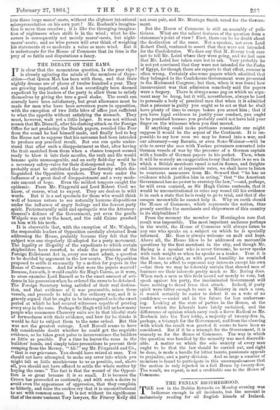THE POLITICAL MARE'S-NESTERS.
THERE are many humiliating incidents in political exist- ence, as in human existence generally. As physical life consists chiefly of making tissue and simultaneously using it up, and we are certain to die if either process fails, though it would have seemed so much simpler that instead of the constant flux and efflux we should keep the same bodies for a time when once they are complete,—so political life chiefly consists in first making and then removing temporary arrangements for the national welfare, and if either process ceased, there again would bo political death. But that is not the most humiliating thing, after all. It is the vast energy expended on the manufacture and destruction not of oven temporary utilities, but of mere political errors, on the secretion and absorption of diseased tissues, which never ought to have existed at all, and only serve, for example, to obscure the vision like a cataract,—this is the truly humiliating part not only of political, but of all human life. The learn- ing for a temporary purpose and forgetting when it is answered, is not very dignified, perhaps, but it is a part of human nature, and we must not be ashamed to be what we are. But this consumption of vitality on learning what was never true, acting upon it as if it were, and then unlearn- ing it again in confusion of spirit, is a sad part of existence, and a ludicrously largo part of Parliamentary existence, which every one must wish to see somewhat reduced in quantity. There are three gentlemen who, from very different moral causes, have within the last year contributed much to the stock of Parliamentary illusions, and of the marvellous mis- direction of whose energies in generating error we have had ample evidence in the last week—Mr. Kinglake, Mr. Lindsay, and Mr. Roebuck. Of Mr. Kinglake we should never desire to speak without literary respect. We are sure that he wishes to keep as much in harmony with the incredulous spirit of modern criticism as it is in his power to do. He sympathizes with the sceptical spirit on all questions of prin- ciple, and can laugh well at himself for the credulous ten- dencies of his own highest impulses and sentiments. When his sources of information are common to him with all other men, he can sift them narrowly, and place little reliance in them. As a human being, he knows that he is fallible, and knows it better, perhaps, than most other human beings. But make him a "special vessel" of a new political revelation, and his questioning spirit vanishes at once. Direct upon him a little rill of false "special" information—even though it be also, as it generally is, specially false information—and Mr. Kinglake is at once to be numbered amongst the prophets. He cannot resist the vanity of being the first to discover a secret treaty. The counter-consideration, that it is somewhat absurd to be always making strictly subjective discoveries, and repre- senting them as objective, does not control him in the least. His fictitious dangers. boldly attribute it to another, without any hesitation in Before we can speak of Mr. Lindsay's and Mr. Roebuck's their own mind, as a matter of fact. This is the only way in abilities in the same direction, we must give some brief ac- which we can interpret Mr. Lindsay's astounding confirma- count of the curious political mare's-nest which the publication tion of the message delivered by Mr. Roebuck last July pur- this week of the American foreign correspondence, with Mr. porting to come from the Emperor of the French to the Dayton's letters from Paris to Mr. Seward, has so effectually English House of Commons. There was something so im- exposed. Last July, it will be remembered, Mr. Roebuck probable in the whole account of that transaction to any sound_ " pledged his word" in the House of Commons to three dis- judge, something so unlike the Emperor's sense and caution in tint statements. First, he said that the Emperor gave a specific a verbal intervention of that description in English Parliamen- reason for declining to make a formal application to England tary debate, that a shrewd man like Mr. Lindsay could not to recognize the South. The Emperor's reason, said Mr. Roe- have blundered into belief in it but for the coarse credulity buck, was thus expressed :—" Some months ago I did make which springs from a conviction that every consideration of a formal application to England; England sent my despatch material advantage impelled the Emperor to such a step_ to America. That despatch getting into Mr. Seward's hands There are men who would more easily believe in a miracle was shown to my ambassador at Washington. It came back which it was visibly and strongly the worker's interest to to me. I feel that I was ill-treated by such conduct. I work, than in the most ordinary action that was manifestly in- won't [ho added], I can't subject myself again to the danger jurious to the agent. Mr. Lindsay is a man of much sagacity.. of similar treatment." Now, both Mr. Seward and M He saw when none of his brother shipowners saw that the Drouyn de Lhuys have confirmed the statement of Mr navigation monopoly was an injury instead of a benefit to the Layard that this whole story is pure fiction. "You were trade. He is long-headed in a narrow way. But he is not altogether right," writes Mr. Seward to Mr. Dayton, " in only incredulous of disinterested actions, he is credulous of correcting the strange misapprehension -which assumed interested actions, and we suppose he saw so clearly the pres- that the British Government had disloyally shown to sure of political interests on the Emperor's mind causing him me confidential despatches of M. Dronyn de Lhuys to wish for a speedy Confederate success,—King Cotton and The first knowledge which the Government of the United Emperor Maximilian both urging him in the same direction, States had of the French proposition was received from the —that he gave in his own mind the largest possible latitude French Government itself;" and Mr. Dayton writes back :— to the Emperor's words, and so sanctioned by his own poli- " I read your statement to M. Dronyn de Lhuys, though it tical shrewdness Mr. Roebuck's account of his wonderful was hardly necessary. We had heretofore talked the matter dream at Fontainebleau. over, and the misstatement of Mr. Roebuck was well under- Mr. Roebuck's great talents in the same direction are more stood. What rendered this statement of that gentleman the easily explained. He has himself told us that his instincts more extraordinary is the fact that after the most diligent are those of a vigilant dog. " Tear'em " is always on the search no other despatch, as M. Drouyn de Lhuys informs look-out for an enemy. Now, any one who has ever noticed me, can be found in the Foreign Office of this Government to a good terrier snuffing about on his rambles after concealed which his statement can possibly apply. And Mr. Layard, rats or imaginary badgers, knows how very creative an ima- Bou will recollect, made a like statement as to the files in the gination that species of animal has. If a slight whiff of some ritish Foreign Office. Take it all in all, it was the most futile hostile scent passes him on the breeze, he will immediately and abortive attempt to help on the recognition of the South refer it to some suspicious-looking hole, and begin digging, and that men in a prominent position ever made." tearing, and snuffing away like a lunatic as ho is. Mr. i Roe- Mr. Roebuck's second fiction was that the Emperor had buck's instinct during his conversation with theEmperor mme- said that though ho could not make advances again to diately scented three probable scrimmages. There was a whiff of England, "I will do everything short of it. I give you full something like sore feeling between the Emperor and the Eng- liberty to state to the English House of Commons this my 'WI Government which might be fomented into an angry mis- wish, and to say to them that I have determined in all understanding. There was a very strong whiff of something things, and I will quote his words :--g I have determined in like hostility between the Emperor and the North, which might. all things to act with England, and, more than all things, I be fomented into a regular war. There was a faint scent of have determined to act with her as regards America.' " " It something like a diplomatic evasion on the part of Ia. may not be amiss," writes Mr. Dayton, " that I should state Layard and the Foreign Office, in relation to the French that the Emperor himself, since the visit of Messrs. Lindsay Ambassador Baron Gros, which promised a very likely kind. and Roebuck, has said explicitly that he had given no antho- of personal quarrel. With all these germs of bitterness in rity to those gentlemen to propose anything, or in any way to the wind, how could Mr. Roebuck help exaggerating them political temperament in these cases is like the gambler's, on represent his views to the British Government." And in a sub- which the prospect of a great gain always makes so much sequent despatch M. Dronyn de Lhuys says he [the Emperor keener an impression than the prospect of the corresponding "never dreamed of their attempting, to use them [his words loss, that the latter entirely fails to check the former. Indeed, as they afterwards did in the House of Commons." the case is worse ; for with the gambler the chances are often Thirdly, Mr. Roebuck stated that the Emperor had not nearly even, while with the speculator in strictly private only commissioned him to lay this matter before the House and special political information as to secret treaties and of Commons and the British Government, but had communi- such things, the chances must be infinitesimal. We ima- cated this intention to Baron Gros. And it was everywhere gine the root of this curious credulity is in an undue ap- whispered about in confirmation of this statement that plication of the " argument from design." There is to Mr. Baron Gros had himself stated that he had received Kinglake's mind something so providential in the direction of such a communication. "Now, Sir," said Mr. Roe- such information to his own individual personality, that like buck, "there is no mistake about this matter, I pledge the adaptation of the eye to light, or better, perhaps, the my veracity that the Emperor told me that. He told me that mother's milk to the infant,—the mere fact of the secret the thing had been sent to Baron Gros. And to tell me that the information reaching him demonstrates its authenticity. This British Government does not know that that has occurred must or something like this must have been the suppressed premiss mean some evasion,—some diplomatic evasion." " As to the that induced so cultivated a man to believe absolutely in such remarks attributed to Baron Gros," says Mr. Dayton, "M. fictions as the treaty ceding Sardinia to France, and last week Dronyn de Lhuys would scarcely permit me to finish the in his discovery of a secretly organized Russian plot for statement of what they were. He began shaking his head absorbing the territory of Denmark,—which turned out to be as I went on, and at the close promptly said Baron Gros never a mere expression of opinion by the Russian Government, made such remarks. He had never said anything of the kind, duly presented to Parliament, thoroughly considered by the official or unofficial, public or private, as if knowing the views• Government of the day, and not assented to by any one. We of the Baron on this question. He disclaimed the statement strongly advise Mr. Kinglake, both for his own sake and the for him in the most positive manner." public's, to distrust especially all special information, and not Now, what are we to think of the talents of the two gentle- conceive that because he can trace up accurately the chain of men who have invented this monstrous political fabrication detail to its source, because he is informed not only of the ex- Mr. Lindsay's talents as a mare's-nester are no doubt of very- istence of the mare's nest, but whose mare it was that built it, different origin from Mr. Kinglake's. There are certain dis- what colour she is, and how long she has been brooding there, coveries of this species which, though purely illusive, yet grow- th& detail lends evidence to the story. It may be quite true not out of credulity, but out of a narrow or vulgar interprets- that if such secret treaties existed at all, Mr. Kinglake would tion of the force of interest. Men accustom themselves, some- be selected as the vessel for their exposure. Still, the con- times, to think of how they would certainly be compelled by eciousness of this sort of mission should not blind him to the their own interest to act in another man's place till they can- danger of becoming a vessel of dishonour for the discovery of not separate that impression from the situation at all, and. fictitious dangers. boldly attribute it to another, without any hesitation in Before we can speak of Mr. Lindsay's and Mr. Roebuck's their own mind, as a matter of fact. This is the only way in abilities in the same direction, we must give some brief ac- which we can interpret Mr. Lindsay's astounding confirma- count of the curious political mare's-nest which the publication tion of the message delivered by Mr. Roebuck last July pur- this week of the American foreign correspondence, with Mr. porting to come from the Emperor of the French to the Dayton's letters from Paris to Mr. Seward, has so effectually English House of Commons. There was something so im- exposed. Last July, it will be remembered, Mr. Roebuck probable in the whole account of that transaction to any sound_ " pledged his word" in the House of Commons to three dis- judge, something so unlike the Emperor's sense and caution in tint statements. First, he said that the Emperor gave a specific a verbal intervention of that description in English Parliamen- reason for declining to make a formal application to England tary debate, that a shrewd man like Mr. Lindsay could not to recognize the South. The Emperor's reason, said Mr. Roe- have blundered into belief in it but for the coarse credulity buck, was thus expressed :—" Some months ago I did make which springs from a conviction that every consideration of a formal application to England; England sent my despatch material advantage impelled the Emperor to such a step_ to America. That despatch getting into Mr. Seward's hands There are men who would more easily believe in a miracle was shown to my ambassador at Washington. It came back which it was visibly and strongly the worker's interest to to me. I feel that I was ill-treated by such conduct. I work, than in the most ordinary action that was manifestly in- won't [ho added], I can't subject myself again to the danger jurious to the agent. Mr. Lindsay is a man of much sagacity.. of similar treatment." Now, both Mr. Seward and M He saw when none of his brother shipowners saw that the Drouyn de Lhuys have confirmed the statement of Mr navigation monopoly was an injury instead of a benefit to the Layard that this whole story is pure fiction. "You were trade. He is long-headed in a narrow way. But he is not altogether right," writes Mr. Seward to Mr. Dayton, " in only incredulous of disinterested actions, he is credulous of correcting the strange misapprehension -which assumed interested actions, and we suppose he saw so clearly the pres- that the British Government had disloyally shown to sure of political interests on the Emperor's mind causing him me confidential despatches of M. Dronyn de Lhuys to wish for a speedy Confederate success,—King Cotton and The first knowledge which the Government of the United Emperor Maximilian both urging him in the same direction, States had of the French proposition was received from the —that he gave in his own mind the largest possible latitude French Government itself;" and Mr. Dayton writes back :— to the Emperor's words, and so sanctioned by his own poli- " I read your statement to M. Dronyn de Lhuys, though it tical shrewdness Mr. Roebuck's account of his wonderful was hardly necessary. We had heretofore talked the matter dream at Fontainebleau. into three large mares'-nests, without the slightest intentional misrepresentation on his own part ? Mr. Roebuck's imagina- tion is more than creative ; it is like the thronging imagina- tion of nightmare when strife is in the wind ; what he dis- covers is consequently not merely mares'-nests, but night- mares'-nests; and no wise person will ever think of weighing his statements at so moderate a value as mere wind. But it is unfortunate for the House of Commons that its time is the prey of so futile and disputatious a fancy.
































 Previous page
Previous page